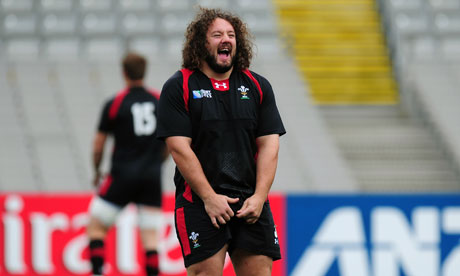
1 The breakdown
The biggest single reason for Wales's marked improvement in the World Cup is their ability to retain possession after a tackle and to force turnovers. Their breakaway Sam Warburton is one of the contenders for the man of the tournament but Wales are working as an eight at the breakdown and their fitness is having a telling impact. The worst side in this year's Six Nations when it came to ruck efficiency, they are one of the best in that area in this tournament and the return of the prop Gethin Jenkins has been a factor. France have a different back row, not quite as mobile but strong in the tackle, and they will struggle to match Wales for speed. The ability of the French tight five and their midfielders to clear opponents out of rucks will be crucial. It is an area where Wales look to have an advantage.
2 The scrum
France pride themselves on their prowess up front but they were given an uncomfortable first hour by the All Blacks in last month's group match. They blamed Alain Rolland, who is also the referee for the semi-final, for allowing Tony Woodcock to get away with illegal binding but they also missed their injured tighthead prop Nicolas Mas, who missed the match because of a hamstring injury. He is back and will look to exploit Gethin Jenkins's preference for running around the field rather than scrummaging but Jenkins is a prop who is hard to pin down. The scrum was one of Wales's weakest areas in their two warm-up matches against England in August but they were without both Jenkins and Adam Jones, Test Lions in 2009. Jones gave Cian Healy, the tormentor of Australia, an uncomfortable afternoon in last weekend's quarter-final. France have two looseheads in their match 22 and will need to use them both because Jones always lasts the full 80 minutes.
3 The lineout
This is another area where Wales have improved during the World Cup. Luke Charteris has forced out Bradley Davies from the second row and, while that has given Wales less of a ball-carrying impact, Charteris is the tallest player in the tournament. Wales are not only more secure on their own throw but they even took a couple off Ireland last week. They have started to use Warburton cleverly and the forwards coach, Robin McBryde, has paid tribute to Alun Wyn Jones, who calls the lineout. It is an area where Wales have become smarter but France have not varied their approach: most of the throws go to Imanol Harinordoquy or Julien Bonnaire at the back providing front-foot possession for the half-backs. The second-rows Pascal Papé and Lionel Nallet are used sparingly but they are used to drive mauls from lineouts, a strategy Wales rarely employ.
4 Defence
Wales made the most tackles in this year's Six Nations, 571, a total they have exceeded by three in this World Cup. Their back row attempted 65 tackles against Ireland last week and did not miss one. Their strategy against the Irish was to go low and bring the tackler to ground immediately, ensuring a contest for the ball on the floor rather than being drawn into a mauling game. Ireland did not look to off-load but France have more athletic forwards and Wales will need one player to go high and another low. France's defence has been the worst of the four semi-finalists, with 11 tries leaked in their five matches, and Morgan Parra does not look comfortable at fly‑half in defence. Wales's conditioning work in Poland in July has reaped its reward. They have only once conceded points in the final quarter of a match, Francois Hougaard's 66th-minute try for South Africa on the opening weekend, and no one has kicked a penalty in the second half against them.
5 Attack
Not long ago sides reckoned that if they stopped Shane Williams, Wales would struggle to score a try. Williams is still roaming the field but Wales now have a multipronged attack. Jamie Roberts has caused havoc with his bulldozing runs in midfield, receiving the ball on the run and attacking defenders at pace, while on the wing George North takes even more stopping. Williams and Leigh Halfpenny provide defenders with a different problem, quick feet, and such has been Wales's adroit use of runners that Jonathan Davies has been able to exploit the attention being paid to others. France can be irresistible in attack, as they were in the first 10 minutes against New Zealand, and runners such as Maxime Médard, Vincent Clerc, Alexis Palisson and Maxime Mermoz will challenge Wales in a way they have not been tested so far. France will need to attack because they are unlikely to prevail in a war of attrition against such a well‑conditioned side.

